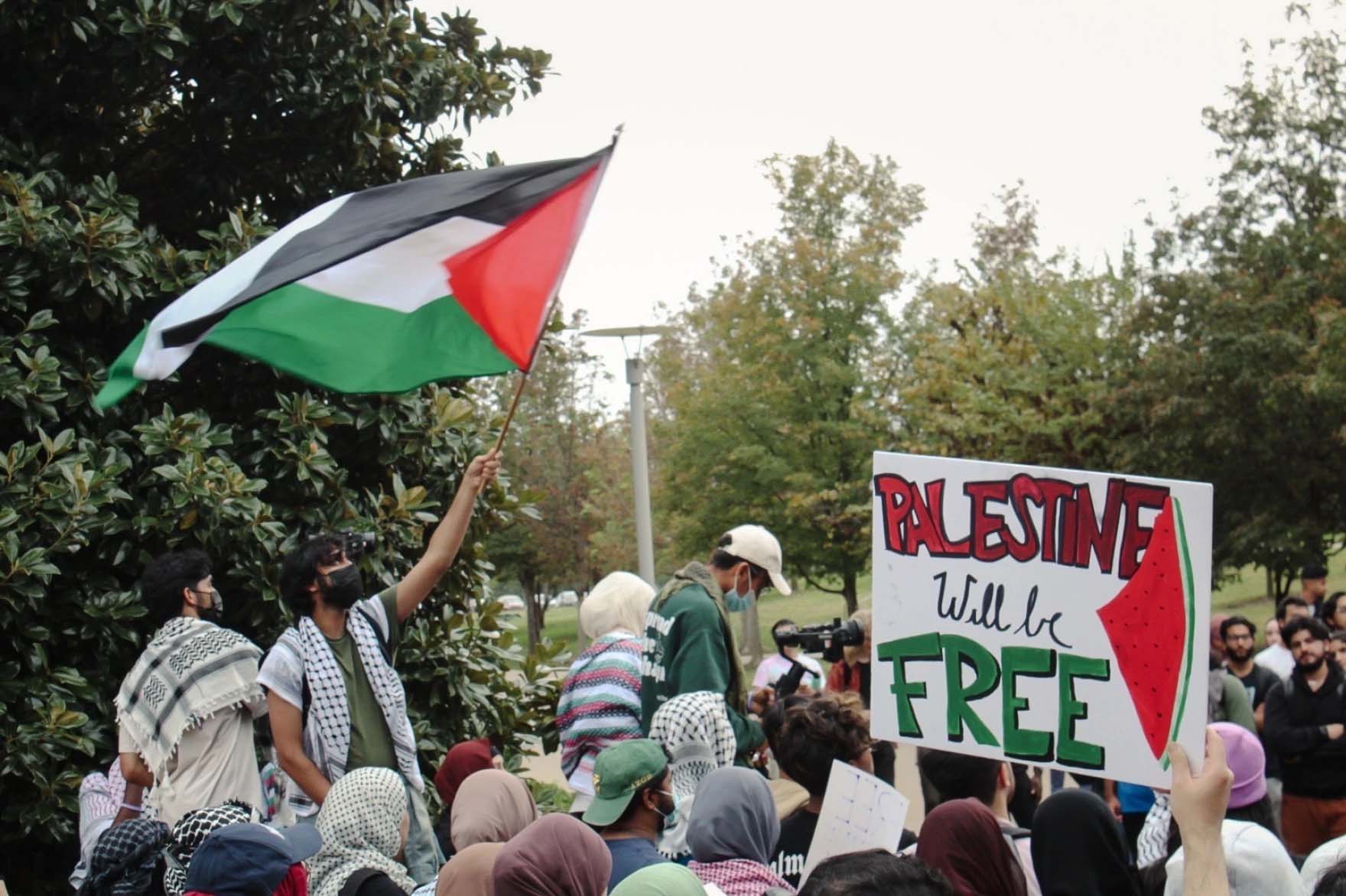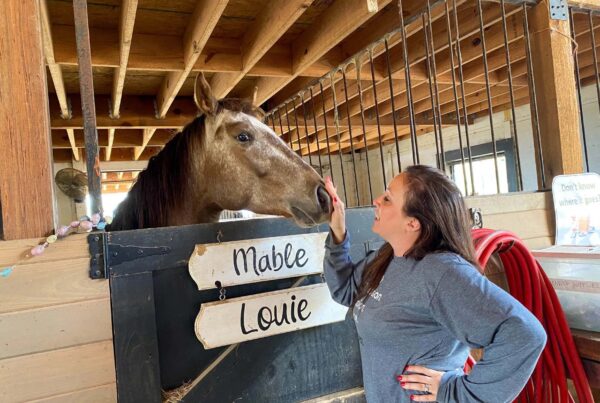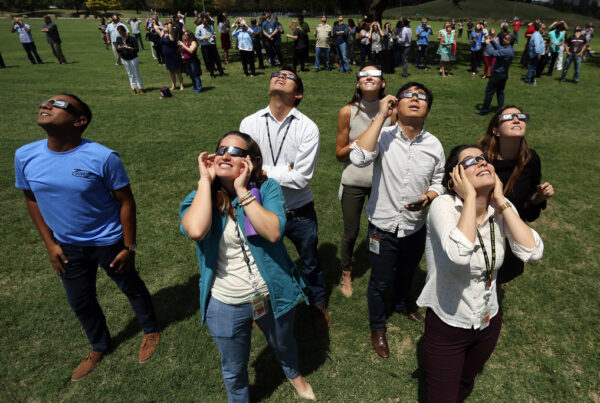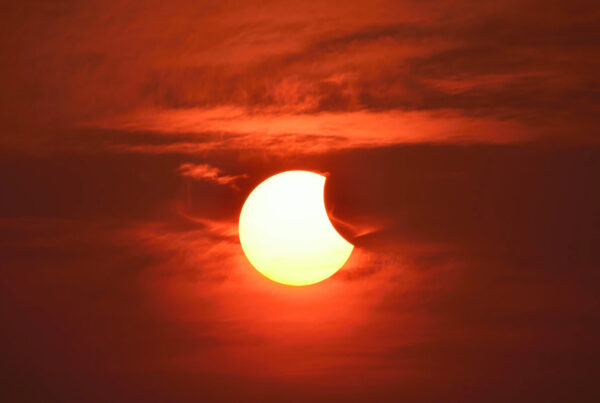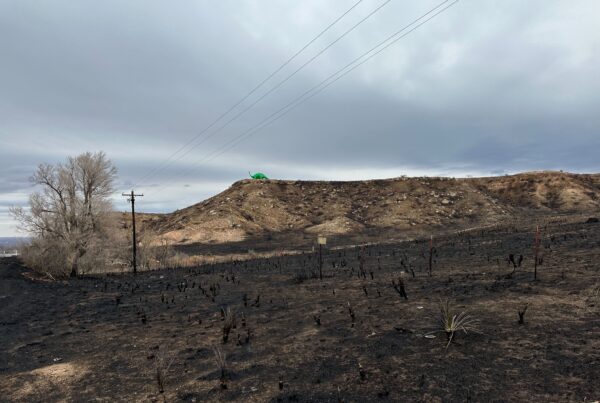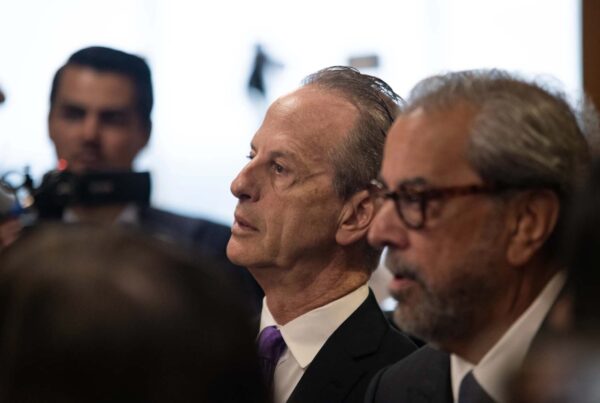From Texas Public Radio:
Since the war in Gaza began nearly six months ago, college campuses across the United States have become the epicenter of protests against the war — and criticism for the way university leaders respond to them.
Last week, Gov. Greg Abbott became the latest to crack down on those protests. In an executive order, Abbott reiterated his unwavering support for Israel and said there has been a “sharp rise” in antisemitism on college campuses in Texas since Hamas attacked Israel on Oct. 7.
He ordered the state’s public colleges and universities to revise their free speech policies to include punishments for antisemitic speech and acts and singled out two pro-Palestinian student groups for discipline, including possible expulsion.
Student activists who could be affected by the order say it is both unsurprising and illegal.
“We’ve seen repression and censorship happen to student organizers all across the United States,” said University of Texas at Dallas student Fatima Tulkarem.
Tulkarem is vice president of the UT Dallas chapter of Students for Justice in Palestine. Abbott’s order singled out her group and the Palestine Solidarity Committee for discipline.
A joint statement released by 11 chapters of the pro-Palestinian student groups from across Texas said the order is both a violation of their First Amendment rights and a misrepresentation of their goals.
“These are smears rooted in racist tropes and are taking away from the fact that Israel has killed tens of thousands of Palestinians. And that’s where our main focus should be,” Tulkarem said. “We want justice for Palestinians and Palestine, and in his executive order he kind of framed it as us being — as us fighting for something else.”
However, Arthur Maserjian with the Combat Antisemitism Movement thinks the governor’s order will help protect Jewish students. He said the definition of antisemitism Abbott directs universities use will help administrators know what actions should be punished.
“The working definition of antisemitism includes 11 examples of contemporary antisemitism, so it helps government officials, decision makers, university administrators, educators, law enforcement officials recognize when an incident crosses the line into antisemitism,” Maserjian said.
Maserjian pointed to spray painted words about genocide and murder on a Jewish student building at the University of Texas at Austin last month as an example of the rise in antisemitism the governor’s order could address.
“That crossed the line into antisemitism because the center for Jewish Life on campus, that serves as a gathering place and a place of prayer for Jewish Americans, was targeted for a conflict that’s taking place thousands of miles away,” Maserjian said.
The perpetrator of that crime has not been identified.
In February, a 23-year-old Palestinian American was stabbed near UT Austin after attending a protest. A 36-year-old white man was arrested for the attack.
Pro-Palestinian students see a double standard in the governor’s order because it focuses solely on antisemitism and doesn’t mention consequences for other types of hate speech.
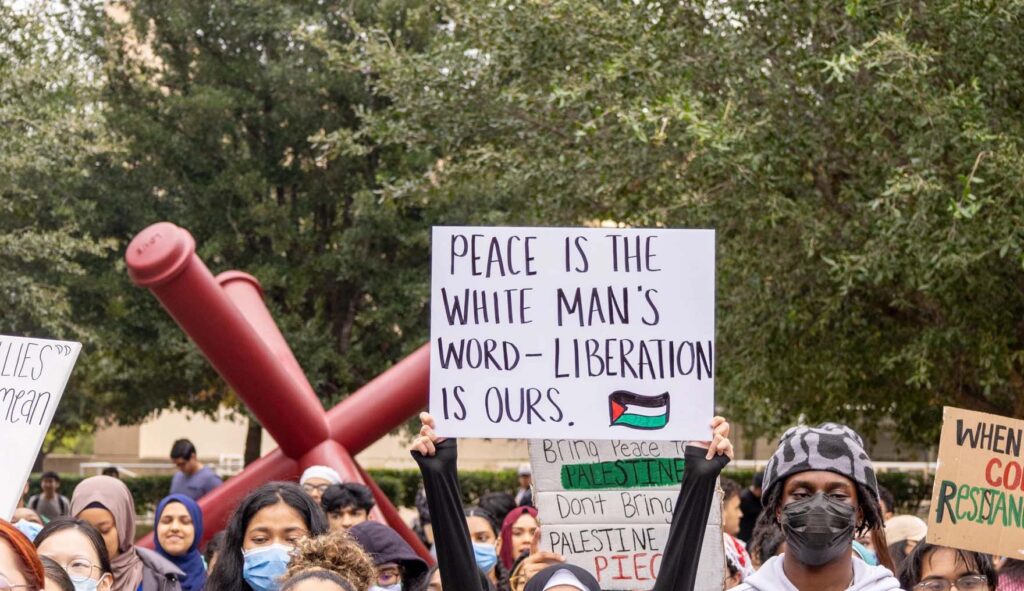
Students at a pro-Palestinian protest at UT-Dallas.
Courtesy of Students For Justice In Palestine UT-Dallas
“All these Islamophobic and anti-Palestinian and anti-Arab hate crimes are happening, and our university hasn’t said anything about them,” Tulkerem said.
When asked about the students’ concerns, the University of Texas System sent a statement saying they are quote “opposed to discrimination, bigotry and hatred in all forms, including antisemitism” and would comply with the governor’s order.
The U.S. is seeing a spike in both anti-Jewish and anti-Arab hate right now, said Rachel Carroll Rivas with the Southern Poverty Law Center.
“And that’s because many of the same groups who are really fomenting and targeting Jewish community are also the same groups who are targeting Muslim and Arab communities,” Carroll Rivas said. “The problem is that they’re using the moment to divide folks.”
Carroll Rivas said the groups behind that rise in hate are far-right, anti-government extremists, and that those groups often target college campuses. As the interim director of the Intelligence Project at SPLC, Carroll Rivas monitors domestic hate groups.
“It’s incredibly important that all of our leaders … when they seek to address a real problem like antisemitism or other forms of bigotry, that there is also an acknowledgment of where the problem is coming from,” Carroll Rivas said.
Free speech or hate speech
In his order, Abbott pointed to a popular pro-Palestinian chant — “From the river to the sea, Palestine will be free” — as an example of antisemitic speech that incites violence.
But University of Houston student Reyna, with the UH chapter of Students for Justice in Palestine, sees it as a call for liberation, not a call for violence.
Reyna only gave her first name out of fear of retribution. She said the chant is free speech, not hate speech.
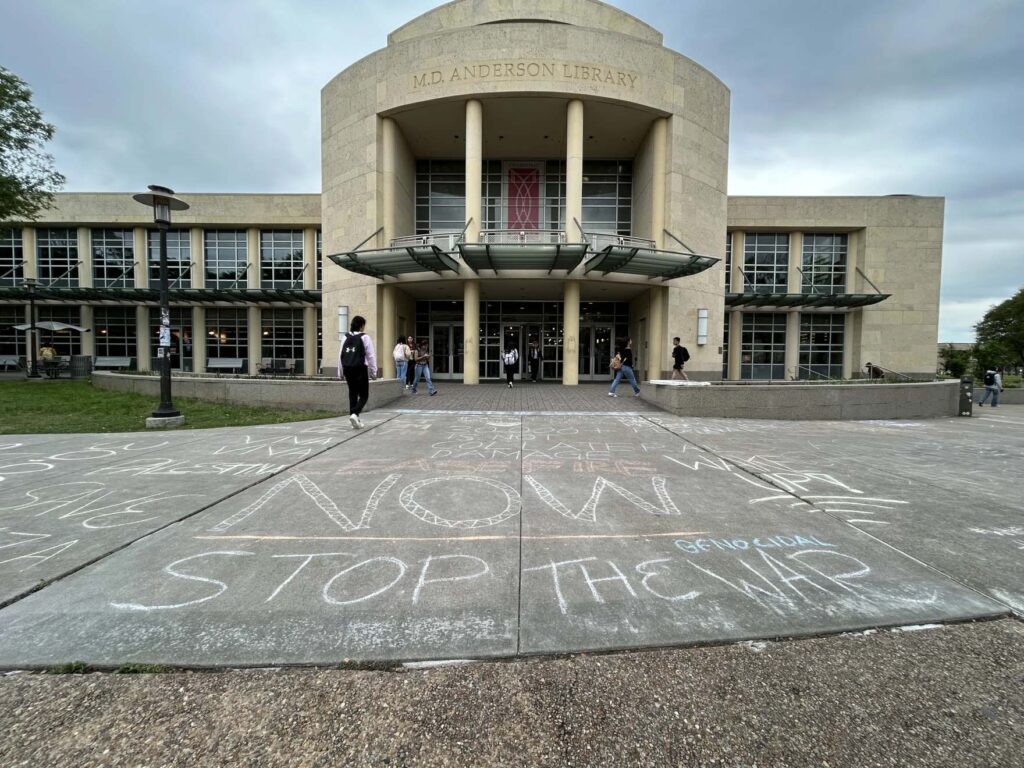
An example of chalking done by pro-Palestinian activists on the University of Houston campus.
Courtesy of Students For Justice In Palestine U Of H
“Right now, in that region, from the river to the sea, Palestinians in the West Bank are enduring brutal military occupation,” Reyna said. “And then Palestinians in Gaza are obviously enduring a genocide.”
The United Nations’ top court found it “plausible” that Israel has committed acts of genocide in Gaza. Israel — with the backing of the United States — strongly refutes that description of the war. But pro-Palestinian activists like Reyna and Tulkarem have no doubts.
They should have the freedom to express that disagreement, said Tyler Coward with the Foundation for Individual Rights and Expression.
“A lot of the protests by student groups, statements in support of Palestinians, most of that is core constitutionally protected speech,” Coward said. “The Constitution just does not tolerate singling out organizations solely because of their viewpoint.”
Coward said universities have an obligation to protect students from hate speech, but the definition of antisemitism the governor has ordered universities to use to determine what actions to punish is overly broad.
“The governor’s executive order relies on a definition of antisemitism that would prohibit core political speech, including speech critical of Israel,” Coward said, pointing to examples that says it is antisemitic to describe the State of Israel as “a racist endeavor” or compare Israeli policy “to that of the Nazis.”
“Student groups can make comparisons of any other government in the world to that of the Nazis,” said Coward, who is lead counsel of government affairs at FIRE.
Arthur Maserjian with the Combat Antisemitism Movement disagreed. He said the definition permits criticism of Israel if it is “similar to that leveled against any other country.”
Maserjian also said he agreed with Abbott that the phrase “from the river to the sea, Palestine will be free” is antisemitic because Hamas has adopted it.
“Hamas uses this as a rallying cry to obliterate Israel and to have it wiped off the map,” Maserjian said. “And Israel contains the largest Jewish community in the world.”
“If you’re echoing language that’s been used historically to call for violence against a specific group of people and a nation state … I think that that has to be taken seriously and should be looked at through the lens of antisemitism, depending on the context.” he said.
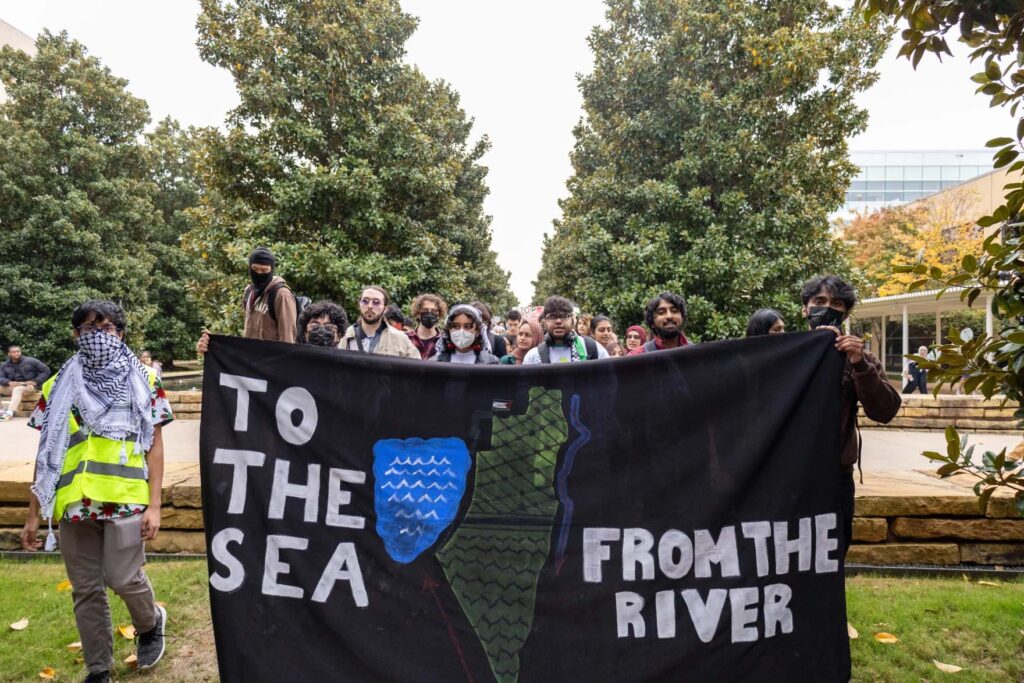
But pro-Palestinian student activists in Texas told TPR they aren’t targeting Jewish people or calling for violence when they use the phrase.
“We stand in solidarity with all marginalized communities,” Tulkarem said. “I think the only violent thing is the Israeli genocide on Palestinians…. It’s kind of hypocritical and interesting when we’re called violent.”
“The status quo right now of what’s happening from the river to the sea is violence towards Palestinians,” Reyna said.
Punishment
Abbott’s order gave the state’s public university systems 90 days to show proof they’ve updated their free speech policies and are enforcing them.
Pro-Palestinian student activists said they were concerned about the consequences they could face, but it won’t stop them from speaking out.
Annah, a student at the University of Texas at San Antonio who asked to go by only first name, said she’s afraid her education could be put at risk simply for being a member of the UTSA chapter of Students for Justice in Palestine.
“I feel responsible as an American, as a person, to do what I can to stop what’s going on, because our government has the power to call for a cease fire, to make a cease fire happen. And we haven’t,” Annah said. “It’s very clear that we need a cease fire. 30,000 [deaths in Gaza] is astronomical.”
“And because I feel that way, and because I’m taking actions for my values, the governor has decided that I could be subject to expulsion for even being involved in this [organization],” she added.
Evan Scope Crafts, a doctoral student at UT Austin, has already been sanctioned by his university for actions he took last semester. He was one of about a dozen students who entered the office of the dean of the School of Social Work to demand the reinstatement of two teaching assistants who lost their jobs.
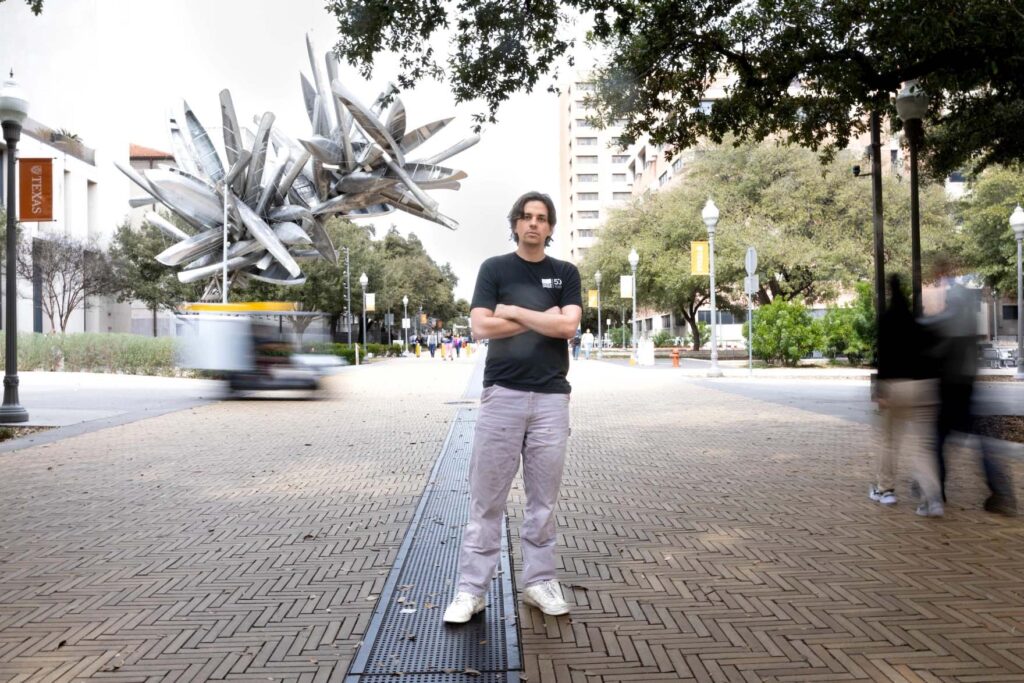
Evan Scope Crafts, a fifth-year doctoral student at UT Austin, was disciplined for participating in a pro-Palestinian protest.
Patricia Lim / KUT News
UT told Scope Crafts and three other students that they engaged in disruptive conduct and unauthorized entry when they went into the dean’s office. According to the sanctions, if Scope Crafts violates any university policy this year he could be suspended for two semesters.
Scope Crafts said he’s concerned the governor’s order could make it even more likely students will be sanctioned or punished for pro-Palestinian protests.
“I’m definitely concerned. And, not just [for] the institutional response,” Scope Crafts said. “To see [the governor] specifically call out Palestinians, the Palestinian Solidarity Committee and Students for Justice in Palestine. … It’s just red meat for his right-wing base and something that could very likely even incite violence against these same people.”
Still, Scope Crafts said he doesn’t expect much about the university’s response to change.
“As somebody who was targeted by this kind of persecution before this order went into practice, this is not something that is going to be fundamentally new moving forward,” he said. “I think it’s really important to note that things like free speech on college campuses have always been selectively interpreted by those in power.”
Despite those concerns, the leaders of the student groups see Abbott’s order as a sign their activism is working, and they felt they have the Constitution on their side.
“It’s clear that the students stand with Palestinians, and it’s clear that the narrative is shifting, especially on college campuses,” Tulkarem said. “When Abbott saw this, he took extreme measures to try and silence us.”
“We know that we’re not a violent movement,” Reyna said. “We know that we’re protected by the highest order of this country, which is the Constitution. So we’re not concerned about it in the sense that we think there’s legitimacy to any sort of attempts to silence.”


